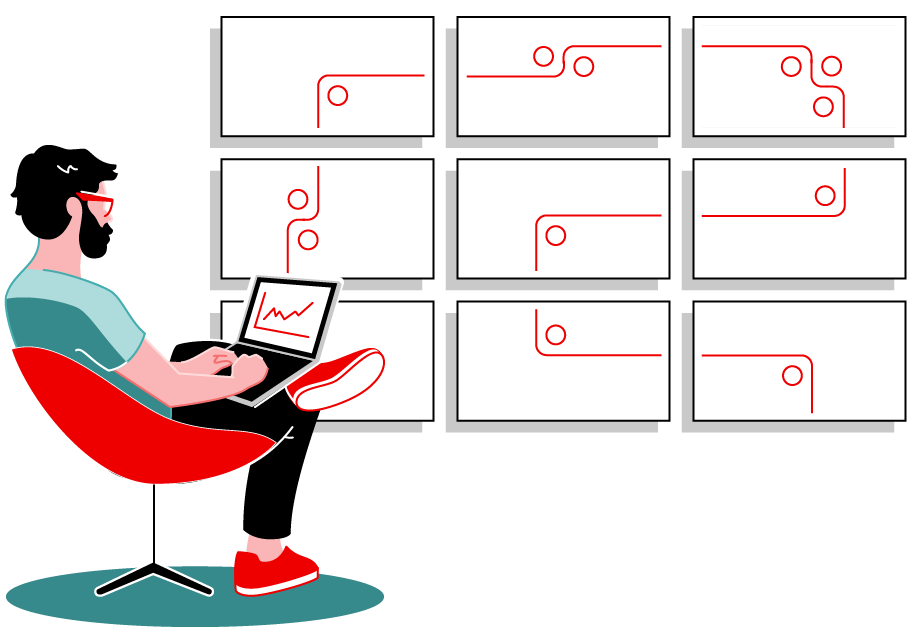RED HAT ANSIBLE AUTOMATION PLATFORM
Expand your customers' automation capabilities
Guide free Ansible users through the benefits of an official Red Hat® Ansible® Automation Platform subscription—then help them migrate.
The automation platform your customers need
When current (or potential) customers explore workload automation for the first time, many turn to Ansible—an open source community project sponsored by Red Hat. But scaling free Ansible projects is complex. Ansible power users may become victims of their own success, spending a majority of their time maintaining that work instead of using automation to solve new business-critical needs. And there is no support, security testing, interoperability, or life cycle guarantees for free Ansible.
While customers moving from free Ansible to Ansible Automation Platform will notice many similarities, the migration will help make your customers’ enterprise automation goals a reality.
66% of organizations
expect their use of automation to increase in the next 12 months
100% revenue opportunity
when customers move from free Ansible to Ansible Automation Platform
667% return on investment
for companies who use Ansible Automation Platform
Scale automation with Red Hat Ansible Inside
Red Hat Ansible Inside embeds Ansible Playbook executions inside applications, rolling out the benefits of automation within a control layer already managed by you—the partner.
Product instead of project?
The Ansible upstream open source project is appropriate for individuals automating individual workloads. For your customers that are already scaling automation, our enterprise open source product is a better choice. Ansible Automation Platform is a more comprehensive solution for larger organizations with more complex automation needs. It includes support for developer tooling, flexible deployment options across multiple datacenters and cloud and edge locations, and guaranteed SLA support for compatibility, upgrades, and security vulnerabilities.
Think about it like this
Ansible is a low-cost way to introduce individual customers to the benefits of automation. As a collection of open source community projects, it requires individual users to assemble open source components, create their own documentation (or rely on forums), support their own integrations, and build a working automation system on their own.
Ansible Automation Platform addresses the expansive needs of larger organizations and distributed teams. It knits together the platform’s underlying projects, so teams don’t have to manually connect them or worry about keeping those elements connected. It’s the comprehensive, security-focused platform that accounts need to scale automation initiatives.
Due to complex and time-intensive processes, the community version did not work to our satisfaction. Automation is a critical component of our business operations, and enterprise support was a key reason we decided to use Red Hat’s solution.
Frequently asked questions
What are other partner opportunities once customers adopt Ansible Automation Platform?
There are many additional opportunities for partners, even after customers standardize on Ansible Automation Platform.
Initial services: Between the initial 3-month deployment period, developing initial automation use cases, and preparing your clients for ongoing operations, services costs can exceed 160% of annual Ansible Automation Platform subscription spend.
Professional services: Assisting your customers with additional automation projects was, on average, larger than the initial project opportunity—worth 250% of subscription revenues.
Reselling subscriptions: Partners surveyed by Forrester Consulting reported re-selling subscriptions to some or all of their customers– and usually retain 5% to 15% of the total annual subscription.
Forrester. “The Partner Opportunity for Red Hat Ansible Automation Platform,” November 2022.
How many people use Ansible Automation Platform?
Ansible Automation Platform has more than 3000 customers with about 7,000,000 managed nodes across all verticals. Over a third of customers already have strategic automation initiatives underway and adoption will quickly accelerate, according to IDC.
How can I measure the impact of Ansible Automation Platform for my customers?
We created this time savings calculator just for this. Guide your customers through a few short questions to find out how much time they could save by using Ansible Automation Platform across their organization.
If I am not already a Red Hat partner, how do I learn more about becoming one?
Check out all the benefits and opportunities that are available when you become a Red Hat partner.




